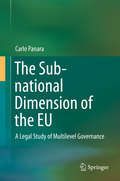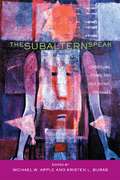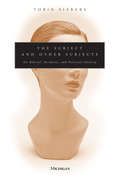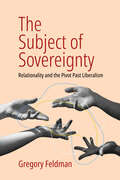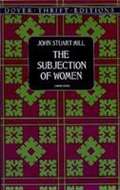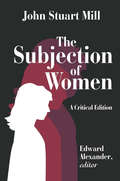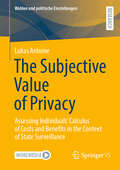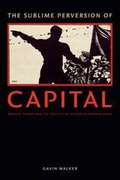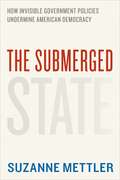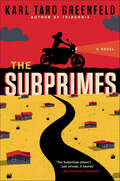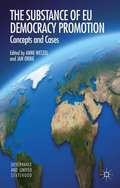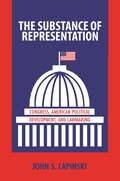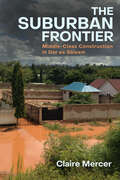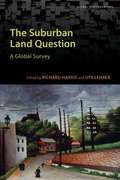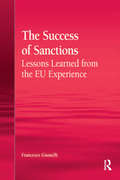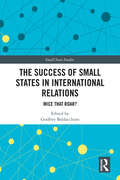- Table View
- List View
The Stupidity of War: American Foreign Policy and the Case for Complacency
by John MuellerIt could be said that American foreign policy since 1945 has been one long miscue; most international threats - including during the Cold War - have been substantially exaggerated. The result has been agony and bloviation, unnecessary and costly military interventions that have mostly failed. A policy of complacency and appeasement likely would have worked better. In this highly readable book, John Mueller argues with wisdom and wit rather than ideology and hyperbole that aversion to international war has had considerable consequences. There has seldom been significant danger of major war. Nuclear weapons, international institutions, and America's super power role have been substantially irrelevant; post-Cold War policy has been animated more by vast proclamation and half-vast execution than by the appeals of liberal hegemony; and post-9/11 concerns about international terrorism and nuclear proliferation have been overwrought and often destructive. Meanwhile, threats from Russia, China, Iran, and North Korea, or from cyber technology are limited and manageable. Unlikely to charm Washington, Mueller explains how, when international war is in decline, complacency and appeasement become viable diplomatic devices and a large military is scarcely required.
The Sub-national Dimension of the EU
by Carlo PanaraThis book is the first monograph-form legal study on multilevel governance in the EU and represents a radical change in the approach to this topic. Particularly after the Treaty of Lisbon's entry into force, research on multilevel governance can no longer remain confined to the analysis of political dynamics or of soft law arrangements. Multilevel governance emerges as a constitutional principle in the European constitutional space, envisaging a method of governance based on the strong involvement of sub-national authorities in the creation and implementation of EU law and policy. Its foundation is in the mosaic resulting from the constitutional systems of the Union and its Member States. Multilevel governance arrangements play a fundamental part in achieving key Treaty objectives (such as subsidiarity, respect for the national identities of the Member States including regional and local self-government, openness, and closeness to the citizen). These arrangements lend legitimacy to EU decision-making, while also promoting constitutionalism and democracy in the EU.
The Subaltern Speak: Curriculum, Power, and Educational Struggles
by Michael W. Apple Kristen L. BurasThe question of whose perspective, experience and history is privileged in educational institutions has shaped curriculum debates for decades. In this insightful collection, Michael W. Apple and Kristen L. Buras interrogate the notion that some knowledge is worth more than others. The Subaltern Speak combines an analysis of the ways in which various forms of power now operate, with a specific focus on spaces in which subaltern groups act to reassert their own perceived identities, cultures and histories.
The Subject and Other Subjects: On Ethical, Aesthetic, and Political Identity
by Tobin SiebersThe Subject and Other Subjectstheorizes the differences among ethical, aesthetic, and political conceptions of identity. When a person is called beautiful, why does it strike us as an objectification? Is a person whom we consider to be an exemplary person still a person, and not an example? Can one person conceive what it means to have the perspective of a community? This study treats these thorny issues in the context of recent debates in cultural studies, feminism, literary criticism, narrative theory, and moral philosophy concerning the nature and directions of multiculturalism, post-modernity, and sexual politics. Tobin Siebers raises a series of questions that "cross the wires" among ethical, aesthetic, and political definitions of the self, at once exposing our basic assumptions about these definitions and beginning the work of reconceiving them. The Subject and Other Subjectswill broaden our ideas about the strange interplay between subjects and objects (and other subjects!) that characterizes modern identity, and so provoke lively debate among anthropologists, art historians, literary theorists, philosophers, and others concerned with how the question of the subject becomes entangled with ethics, aesthetics, and politics. As Siebers argues, the subject is in fact a tangled network of subjectivities, a matrix of identities inconceivable outside of symbols and stories. Tobin Siebers is Professor of English at the University of Michigan, and author ofCold War Criticism and the Politics of Skepticism; Morals and Stories; The Ethics of Criticism; The Romantic Fantastic; andThe Mirror of Medusa.
The Subject of Freedom: Kant, Levinas (Commonalities)
by Gabriela BasterraIs freedom our most essential belonging, the intimate source of self-mastery, an inalienable right? Or is it something foreign, an other that constitutes subjectivity, a challenge to our notion of autonomy? To Basterra, the subjectivity we call free embodies a relationship with an irreducible otherness that at once exceeds it and animates its core.Tracing Kant’s concept of freedom from the Critique of Pure Reason to his practical works, Basterra elaborates his most revolutionary insights by setting them in dialogue with Levinas’s Otherwise than Being. Levinas’s text, she argues, offers a deep critique of Kant that follows the impulse of his thinking to its most promising consequences. The complex concepts of freedom, autonomy, and subjectivity that emerge from this dialogue have the potential to energize today’s ethical and political thinking.
The Subject of Human Rights (Stanford Studies in Human Rights)
by Danielle Celermajer and Alexandre LefebvreThe Subject of Human Rights is the first book to systematically address the "human" part of "human rights." Drawing on the finest thinking in political theory, cultural studies, history, law, anthropology, and literary studies, this volume examines how human rights—as discourse, law, and practice—shape how we understand humanity and human beings. It asks how the humanness that the human rights idea seeks to protect and promote is experienced. The essays in this volume consider how human rights norms and practices affect the way we relate to ourselves, to other people, and to the nonhuman world. They investigate what kinds of institutions and actors are subjected to human rights and are charged with respecting their demands and realizing their aspirations. And they explore how human rights shape and even create the very subjects they seek to protect. Through critical reflection on these issues, The Subject of Human Rights suggests ways in which we might reimagine the relationship between human rights and subjectivity with a view to benefiting human rights and subjects alike.
The Subject of Liberty: Toward a Feminist Theory of Freedom
by Nancy J. HirschmannThis book reconsiders the dominant Western understandings of freedom through the lens of women's real-life experiences of domestic violence, welfare, and Islamic veiling. Nancy Hirschmann argues that the typical approach to freedom found in political philosophy severely reduces the concept's complexity, which is more fully revealed by taking such practical issues into account. Hirschmann begins by arguing that the dominant Western understanding of freedom does not provide a conceptual vocabulary for accurately characterizing women's experiences. Often, free choice is assumed when women are in fact coerced--as when a battered woman who stays with her abuser out of fear or economic necessity is said to make this choice because it must not be so bad--and coercion is assumed when free choices are made--such as when Westerners assume that all veiled women are oppressed, even though many Islamic women view veiling as an important symbol of cultural identity. Understanding the contexts in which choices arise and are made is central to understanding that freedom is socially constructed through systems of power such as patriarchy, capitalism, and race privilege. Social norms, practices, and language set the conditions within which choices are made, determine what options are available, and shape our individual subjectivity, desires, and self-understandings. Attending to the ways in which contexts construct us as "subjects" of liberty, Hirschmann argues, provides a firmer empirical and theoretical footing for understanding what freedom means and entails politically, intellectually, and socially.
The Subject of Sovereignty: Relationality and the Pivot Past Liberalism
by Gregory FeldmanSeeking new forms of democracy, progressive politics raises a fundamental question: what is the alternative to the allegedly coherent, self-contained liberal subject that represents the project of modernity? Exploring the themes of nature, race, and the divine, this book identifies the more realistic alternative in the “relational subject”: a subject that is inseparable from the global field of relations through which it emerges and yet distinct from that field because it lives a life that no one else ever has. Recognizing ourselves as such subjects allows us not only to rethink politics, but, more profoundly, to envision sovereignty as the means by which we each rejuvenate ourselves and the polities we constitute with others.
The Subjection of Women
by John Stuart MillThe philosopher argues for equality in legal, political, social and domestic relations between men and women. Carefully reasoned and clearly expressed with logic and consistency, the work remains a landmark in the important struggle for human rights.
The Subjection of Women (Dover Thrift Editions Ser.)
by John Stuart MillThe renowned and influential essay by the great English philosopher argues for equality in all legal, political, social and domestic relations between men and women. Carefully reasoned and clearly expressed with great logic and consistency, the work remains today a landmark in the important struggle for human rights.
The Subjection of Women: Original Edition Of 1911 (Barnes And Noble Library Of Essential Reading Ser.)
by John Stuart MillThe Subjection of Women, which Mill wrote in 1861 but did not publish until 1869, is one of the seminal texts of feminism and aroused more antagonism than anything Mill ever wrote. Conservatives predicted it would do to the English family what socialism would do to England's economy. Liberals believed that women would vote conservative. Many prominent Englishwomen, such as Charlotte Brontë, Elizabeth Barrett Browning, Christina Rossetti, and George Eliot, opposed women's suffrage. Even such advanced thinkers as Sigmund Freud were hostile to the book.In The Subjection of Women Mill argues with lucidity, force and more than usual metaphorical eloquence that "the principle which regulates the existing social relations between the two sexes-the legal subordination of one sex to the other-is wrong in itself, and now one of the chief hindrances to human improvement; and that it ought to be replaced by a principle of perfect equality..." Mill does battle on two fronts, that of intrinsic justice and that of utility. He sees the subjection of women as not only inherently wrong, but intertwined with all the evils of existing society. In support of his central principle, Mill argues that there is no basis in nature for the inferior status of women. He likens the position of the Victorian wife to that of a domestic slave and discourses on the debasing nature of all master-slave relations. He provides historical evidence of what women are capable of achieving and he speculates upon the benefits that will accrue to society as well as individuals from female emancipation, most especially from equality in marriage, which Mill describes as the only remaining legal form of slavery.This new critical edition shows that Mill's classic work has lost none of its relevance. The cross-disciplinary approach of the book can be useful in literature, history, or sociology courses as well as womens studies.
The Subjective Value of Privacy: Assessing Individuals’ Calculus of Costs and Benefits in the Context of State Surveillance (Wahlen und politische Einstellungen)
by Lukas AntoineThis book critically examines the subjective value of privacy in the context of state surveillance, exploring how individuals assess costs and benefits of surveillance. It delves into the complex relationship between attitudes towards privacy, security, and state surveillance and challenges the conventional privacy versus security trade-off through three empirical studies. The first study finds that security justifications for surveillance indeed influence public support for surveillance, particularly in liberal democracies. The second study reveals how financial costs and personal convenience influence support for surveillance. The third study suggests that privacy attitudes may be a stable personality trait, influencing decisions across various contexts. By employing cross-comparative analysis and experimental designs, this book enhances our understanding of privacy's subjective value, refines theoretical frameworks, and offers insights into individual decision-making about privacy. By highlighting the dynamic nature of privacy preferences, this work reveals limitations of simplistic theoretical models and sets the stage for future research in the privacy-security nexus.
The Sublime Perversion of Capital: Marxist Theory and the Politics of History in Modern Japan
by Gavin WalkerIn The Sublime Perversion of Capital Gavin Walker examines the Japanese debate about capitalism between the 1920s and 1950s, using it as a "prehistory" to consider current discussions of uneven development and contemporary topics in Marxist theory and historiography. Walker locates the debate's culmination in the work of Uno Kozo, whose investigations into the development of capitalism and the commodification of labor power are essential for rethinking the national question in Marxist theory. Walker's analysis of Uno and the Japanese debate strips Marxist historiography of its Eurocentric focus, showing how Marxist thought was globalized from the start. In analyzing the little-heralded tradition of Japanese Marxist theory alongside Marx himself, Walker not only offers new insights into the transition to capitalism, the rise of globalization, and the relation between capital and the formation of the nation-state; he provides new ways to break Marxist theory's impasse with postcolonial studies and critical theory.
The Submerged State
by Suzanne Mettler“Keep your government hands off my Medicare!” Such comments spotlight a central question animating Suzanne Mettler’s provocative and timely book: why are many Americans unaware of government social benefits and so hostile to them in principle, even though they receive them? The Obama administration has been roundly criticized for its inability to convey how much it has accomplished for ordinary citizens. Mettler argues that this difficulty is not merely a failure of communication; rather it is endemic to the formidable presence of the “submerged state. ” In recent decades, federal policymakers have increasingly shunned the outright disbursing of benefits to individuals and families and favored instead less visible and more indirect incentives and subsidies, from tax breaks to payments for services to private companies. These submerged policies, Mettler shows, obscure the role of government and exaggerate that of the market. As a result, citizens are unaware not only of the benefits they receive, but of the massive advantages given to powerful interests, such as insurance companies and the financial industry. Neither do they realize that the policies of the submerged state shower their largest benefits on the most affluent Americans, exacerbating inequality. Mettler analyzes three Obama reforms—student aid, tax relief, and health care—to reveal the submerged state and its consequences, demonstrating how structurally difficult it is to enact policy reforms and even to obtain public recognition for achieving them. She concludes with recommendations for reform to help make hidden policies more visible and governance more comprehensible to all Americans. The sad truth is that many American citizens do not know how major social programs work—or even whether they benefit from them. Suzanne Mettler’s important new book will bring government policies back to the surface and encourage citizens to reclaim their voice in the political process.
The Submerged State: How Invisible Government Policies Undermine American Democracy (Chicago Studies In American Politics Ser.)
by Suzanne Mettler“Keep your government hands off my Medicare!” Such comments spotlight a central question animating Suzanne Mettler’s provocative and timely book: why are many Americans unaware of government social benefits and so hostile to them in principle, even though they receive them? The Obama administration has been roundly criticized for its inability to convey how much it has accomplished for ordinary citizens. Mettler argues that this difficulty is not merely a failure of communication; rather it is endemic to the formidable presence of the “submerged state.” In recent decades, federal policymakers have increasingly shunned the outright disbursing of benefits to individuals and families and favored instead less visible and more indirect incentives and subsidies, from tax breaks to payments for services to private companies. These submerged policies, Mettler shows, obscure the role of government and exaggerate that of the market. As a result, citizens are unaware not only of the benefits they receive, but of the massive advantages given to powerful interests, such as insurance companies and the financial industry. Neither do they realize that the policies of the submerged state shower their largest benefits on the most affluent Americans, exacerbating inequality. Mettler analyzes three Obama reforms—student aid, tax relief, and health care—to reveal the submerged state and its consequences, demonstrating how structurally difficult it is to enact policy reforms and even to obtain public recognition for achieving them. She concludes with recommendations for reform to help make hidden policies more visible and governance more comprehensible to all Americans. The sad truth is that many American citizens do not know how major social programs work—or even whether they benefit from them. Suzanne Mettler’s important new book will bring government policies back to the surface and encourage citizens to reclaim their voice in the political process.
The Subprimes: A Novel
by Karl Taro GreenfeldA wickedly funny dystopian parody set in a financially apocalyptic future America, from the critically acclaimed author of Triburbia.In a future America that feels increasingly familiar, you are your credit score. Extreme wealth inequality has created a class of have-nothings: Subprimes. Their bad credit ratings make them unemployable. Jobless and without assets, they’ve walked out on mortgages, been foreclosed upon, or can no longer afford a fixed address. Fugitives who must keep moving to avoid arrest, they wander the globally warmed American wasteland searching for day labor and a place to park their battered SUVs for the night.Karl Taro Greenfeld’s trenchant satire follows the fortunes of two families whose lives reflect this new dog-eat-dog, survival-of-the-financially-fittest America. Desperate for work and food, a Subprime family has been forced to migrate east, hoping for a better life. They are soon joined in their odyssey by a writer and his family—slightly better off, yet falling fast. Eventually, they discover a small settlement of Subprimes who have begun an agrarian utopia built on a foreclosed exurb. Soon, though, the little stability they have is threatened when their land is targeted by job creators for shale oil extraction.But all is not lost. A hero emerges, a woman on a motorcycle—suspiciously lacking a credit score—who just may save the world.In The Subprimes, Karl Taro Greenfeld turns his keen and unflinching eye to our country today—and where we may be headed. The result is a novel for the 99 percent: a darkly funny comedy about paradise lost and found, the value of credit, economic policy, and the meaning of family.
The Subsidiary
by Samuel Rutter Matias Celedon"This is a book written in stamps. And it works: the form perfectly emulates the gloomy atmosphere of the subsidiary and the broken emotional environment of its employees. With few words, The Subsidiary says a great deal." --La PolleraIn the subsidiary offices of a major corporation, the power suddenly goes out: the lights switch off; the doors lock; the phone lines go dead. The employees are trapped in total darkness with only cryptic, intermittent announcements over the loud speaker, instructing all personnel to remain at their work stations until further notice.Terrified, one lone worker uses the implements on his desk to give testimony to the horrors that occur during the days he spends trapped in the building, testimony told exclusively --- and hauntingly --- through the stamps he uses to mark corporate documents. Hand-designed by the author with a stamp set he bought in an bookstore in Santiago, Matías Celedón's The Subsidiary is both an exquisite object and a chilling avant-garde tale from one of Chile's rising literary stars.From the Hardcover edition.
The Substance of EU Democracy Promotion
by Anne Wetzel Jan OrbieThe book investigates the substance of the European Union's (EU) democracy promotion policy. It focuses on elections, civil and political rights, horizontal accountability, effective power to govern, stateness, state administrative capacity, civil society, and socio-economic context as components of embedded liberal democracy.
The Substance of Representation: Congress, American Political Development, and Lawmaking (Princeton Studies in American Politics: Historical, International, and Comparative Perspectives #133)
by John S. LapinskiLawmaking is crucial to American democracy because it completely defines and regulates the public life of the nation. Yet despite its importance, political scientists spend very little time studying the direct impact that the politics surrounding a particular issue has on lawmaking. The Substance of Representation draws on a vast range of historical and empirical data to better understand how lawmaking works across different policy areas. Specifically, John Lapinski introduces a theoretically grounded method for parsing policy issues into categories, and he shows how policymaking varies in predictable ways based on the specific issue area being addressed. Lapinski examines the ways in which key factors that influence policymaking matter for certain types of policy issues, and he includes an exhaustive look at how elite political polarization shifts across these areas. He considers how Congress behaves according to the policy issue at hand, and how particular areas--such as war, sovereignty issues, and immigration reform--change legislative performance. Relying on records of all Congressional votes since Reconstruction and analyzing voting patterns across policy areas from the late nineteenth to late twentieth centuries, Lapinski provides a comprehensive historical perspective on lawmaking in order to shed light on current practices. Giving a clear picture of Congressional behavior in the policymaking process over time, The Substance of Representation provides insights into the critical role of American lawmaking.
The Suburban Crisis: White America and the War on Drugs
by Matthew D. LassiterHow the drug war transformed American political cultureSince the 1950s, the American war on drugs has positioned white middle-class youth as sympathetic victims of illegal drug markets who need rehabilitation instead of incarceration whenever they break the law. The Suburban Crisis traces how politicians, the media, and grassroots political activists crusaded to protect white families from perceived threats while criminalizing and incarcerating urban minorities, and how a troubling legacy of racial injustice continues to inform the war on drugs today.In this incisive political history, Matthew Lassiter shows how the category of the “white middle-class victim” has been as central to the politics and culture of the drug war as racial stereotypes like the “foreign trafficker,” “urban pusher,” and “predatory ghetto addict.” He describes how the futile mission to safeguard and control white suburban youth shaped the enactment of the nation’s first mandatory-minimum drug laws in the 1950s, and how soaring marijuana arrests of white Americans led to demands to refocus on “real criminals” in inner cities. The 1980s brought “just say no” moralizing in the white suburbs and militarized crackdowns in urban centers.The Suburban Crisis reveals how the escalating drug war merged punitive law enforcement and coercive public health into a discriminatory system for the social control of teenagers and young adults, and how liberal and conservative lawmakers alike pursued an agenda of racialized criminalization.
The Suburban Frontier: Middle-Class Construction in Dar es Salaam
by Claire MercerA free ebook version of this title is available through Luminos, University of California Press’s Open Access publishing program. Visit www.luminosoa.org to learn more. African cities are under construction. Beyond the urban redevelopment schemes and large-scale infrastructure projects reconfiguring central city skylines, urban residents are putting their resources into finding land and building homes on city edges. The Suburban Frontier examines how self-built housing on the urban periphery has become central to middle-class formation and urban transformation in contemporary Tanzania. Drawing on original research in the city of Dar es Salaam, Claire Mercer details how the "suburban frontier" has become the place where Africa’s middle classes are shaped. As the first book-length analysis of Africa’s suburban middle class, The Suburban Frontier offers significant contributions to the study of urban social change in Africa and urbanization in the Global South.
The Suburban Land Question: A Global Survey (Global Suburbanisms)
by Richard Harris Ute LehrerAs part of the urbanization process, suburban development involves the conversion of rural land to urban use. When discussing the suburbs, most writers focus on particular countries in the northern hemisphere, implying that patterns and processes elsewhere are fundamentally different. The purpose of The Suburban Land Question is to identify the common elements of suburban development, focusing on issues associated with the scale and pace of rapid urbanization around the world. Editors Richard Harris and Ute Lehrer and a diverse group of contributors draw on a variety of sources, including official data, planning documents, newspapers, interviews, photographs, and field observations to explore the pattern, process, and planning of suburban land development. Featuring case studies from major world regions, including China, India, Latin America, South Africa, as well as France, Austria, the Netherlands, the United States, and Canada, the volume identifies and discusses the peculiarly transitional character of suburban land. In addition to place and time, The Suburban Land Question addresses the many elements that distinguish land development in urban fringe areas, including economy, social infrastructure, and legality.
The Success and Failure of Right-Wing Populist Parties in the Benelux Countries (Routledge Studies in Extremism and Democracy)
by Léonie de JongeThis book focuses on the varied support for the populist radical right in the Benelux countries: Belgium, the Netherlands and Luxembourg. Despite many common characteristics, right-wing populist parties have historically been more successful in the Netherlands and Flanders than in Luxembourg and Wallonia. This book argues that the variation in the success of right-wing populist parties depends to a large extent on the way in which they are perceived and received in a given polity. In the Netherlands and Flanders, mainstream parties and the media have contributed to politicising issues pertaining to immigration and national identity, thereby tilling the field for the populist radical right. In Luxembourg and Wallonia, mainstream parties and the media have resolutely limited the opportunities for right-wing populist challengers to influence the public debate. This volume will be of interest to practitioners as well as students and scholars of party politics, the media, the populist radical right and the Benelux region.
The Success of Sanctions: Lessons Learned from the EU Experience
by Francesco GiumelliThe effectiveness of sanctions cannot purely be measured by the way they change the behaviour of their intended target. The degree to which sanctions constrain a rogue state's behaviour and the signals they send to future targets should also be prime considerations. In this thought provoking book Francesco Giumelli measures the true effectiveness of EU sanctions against a range of states including Belarus, Zimbabwe, Moldova, Uzbekistan, the USA and China. He demonstrates that focussing purely on behavioural change is limiting, especially when considering the actions and motivations of an international organisation, and develops a process to evaluate the direct and indirect impact of EU sanctions. Giumelli demonstrates the many different ways sanctions have been used by the EU to produce positive direct and indirect results and provides a multi-level framework to assess the success of sanctions in the future.
The Success of Small States in International Relations: Mice that Roar? (Small State Studies)
by Godfrey BaldacchinoThe Success of Small States in International Relations highlights the normality and power of small states in international relations. This book overturns the stereotype that small states, however defined, are weak and are, or ought to be, consigned to the margins of international relations. It argues that small states are not ‘punching above their weight’, or even anomalies – since it is large states which are the anomaly in the global system. The text unpacks the nature and character of small state success, while also looking critically at thirteen episodes in modern history where small states, singly or collectively, emerged victorious in confrontations with larger states. The case studies, globally sourced, are bookended by conceptual and analytic reviews of what these events mean for diplomacy, international relations and small states more generally. This book will appeal to scholars and students of comparative political science and international relations, particularly from small states, as well as policy makers and senior small state government officers.

